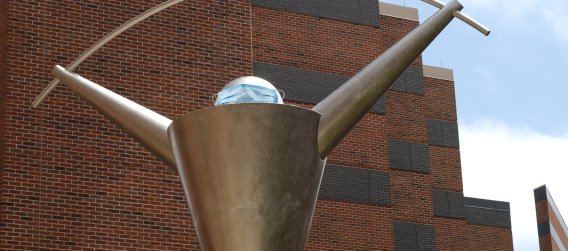Safety

Training
Safety training information for new and current ME employees:
Reporting Safety Incidents
Anonymously Report an Incident
Controller's Office Risk Management & Insurance Resources
DEHS Injury Reporting Procedures
What Should I Report?
- Report any use of a fire extinguisher to your PI and mesafety@umn.edu. Then fill out an ME Safety Experience Report Form.
- Complete a first report of injury (FROI) form for any injuries to PAID employees that are injured at work
- Slipping on ice, carpal tunnel, and headaches from odors are all reportable. See the policy here.
- Report any hazardous spills that occur on the lab floor to your PI. Report any hazardous spills that occur outside of the lab to DEHS.
- Report any odor issues promptly to Facilities Management: 612-624-2900. For natural gas leak, leave the area and call 911.
Forms and Templates
- Emergency Preparedness Plan
- Lab Safety — Audit Items
- Lab Specific Safety Plan Toolkit
- Example map of a lab and emergency shutoff diagram
- Standard Operating Procedure (SOP) example
Hosting high school students in your lab? Email mesafety@umn.edu.
Frequently Asked Questions
Contact:
General Questions and Concerns:
mesafety@umn.edu
Research Officer:
Dr. Chris Hogan
612-626-8312
hogan108@umn.edu
Radiation Officer:
Kelly Daigle
(612) 626-6940
daig0006@umn.edu
DEHS Contact:
Brian Andersson
612-625-8925
ander213@umn.edu
Resources:
- Safety Resources Site
- CSE Specific Resources
- DEHS Lab Fact Sheet Library
- Safe Campus Homepage
- COVID-19 Response
- Building Emergency Plan: Coming Soon!
+
Disposing Chemical Waste
How do I know if my chemical waste is hazardous?
Your MSDS sheets will tell you if the chemical is hazardous or not. You can also check the chemical waste registry. If the chemical has a 05 NH DDC code it is non-hazardous. If you are still unsure, you should treat it as though it is hazardous.
I do not have the necessary MSDS data sheets. What do I do?
Any hazardous material can be disposed by following the directions here.
You are required to be able to readily access a SDS for your materials. These sheets usually come with the material when it is ordered. DEHS also has links to several SDS services.
https://dehs.umn.edu/safety-data-sheetschemical-information-search
http://www.ilpi.com/msds/faq/partd.html#paperless
+
Lab Materials and Equipment
What is the maximum quantity of a combustible or flammable liquid allowed in my lab?
Your lab should have been built so that there is not more flammable storage cabinet space than allowed by code. You can use all the space under your fume hoods and any built in flammable storage cabinets.All flammables and combustibles should be stored in flammable storage cabinets. See the Flammable Hazard Class SOP for more information.
The maximum size for ANY container is 5 gallons (20 L). If you need to store flammables in a container larger than 5 gallons (such as a drum), contact DEHS at (612) 626-6002 for guidance. Small amounts of flammables (<1 L) may be left out in the lab. On a space-available basis, combustibles and containers <1 L should be stored in flammable cabinets. Halogenated organics which are not flammable are not required to be stored in a flammable cabinet. You may choose to put them there to control vapors on a space-available basis.
Do I need to have eyewashes in my lab?
A safety shower and eyewash shall be provided in each lab area equipped with a fume hood. An eyewash shall be provided in other laboratories using hazardous chemical or radiological materials. An eyewash shall be provided in a readily accessible location where BSL2 or BSL3 biological agents are stored and used. BSL1 labs (in addition to BSL2 and BSL3) are now required to have an eyewash installed.
+
Clean Up
How do I get rid of broken glass boxes?
The box will be picked up by custodians if taped shut.
How do I get rid of biohazardous waste?
Biohazardous waste can be brought to the ME dock.
How do I get rid of old equipment?
Old equipment can be disposed through reuse as long as it has not been contaminated by or contains hazardous chemicals or other hazardous materials.
What do I do in case of a chemical spill?
You need to be prepared for such an event. Complete your lab specific emergency plan. The University has numerous resources to help guide you:
Other clean up/disposal
View the FM Waste Guide for more information.
+
Safety Training
Who is supposed to attend the safety training?
Attendance at our annual safety training is required for faculty, staff, teaching assistants and research assistants. If you are a new graduate student, you need to attend the initial safety training. In the following years, you still need to attend the annual safety training.